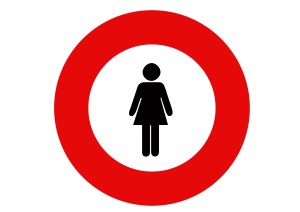Although nearly one hundred years have passed since women gained the right to vote, their representation in Czech politics remains low and has hardly increased. Are women less interested in politics? Are they less qualified or competent than their male counterparts? Or is it that women face hidden obstacles, a form of glass ceiling?
First, a few numbers – women today constitute 20,5% in the Chamber of Deputies, 18,5% in the Senate, and hold three ministries (17,6%). Czech women are better represented at the local level (27,1%). But even here in the 26 largest towns in the Czech Republic, women hold a slim 4% of mayors. With this record it should not surprise that the Gender Gap Index, published since 2006 by the World Economic Forum, has rated the Czech Republic last in four categories in the field of politics.
Some may interpret the low numbers of women in elected office as reflecting a lack of interest among women in political participation. But is this really the case? The problem to me resides elsewhere – in the political parties that give women unfavourable positions on the candidate lists. An analysis by the Czech Statistical Office showed that female candidates standing for election to the Chamber of Deputies in 2013 usually occupied the 21st position or lower. The discrepancy between the number of women in political parties and those in elected positions can be clearly seen in the Christian Democratic Party. Despite the fact that women constitute a higher percentage of party membership (52%), none of the 14 mandates the party won in the aforementioned election went to a woman. Political parties are the gatekeepers blocking a more balanced representation of men and women in politics.
Resistance towards quotas
Quotas are often suggested as a way to increase the number of women in politics. The Czech government has unfortunately refused to adopt mandatory legislative quotas in the candidate lists that would facilitate a gender balance across the party spectrum (parties failing to abide the quota would get reduced state contribution for won mandates).[1]
Let me dispense now with two of the more common arguments against quotas – that they deny free choice and secondly that they may lead to the election of less competent women over more qualified male counterparts – by observing that free choice doesn’t currently exist. Political parties rather than voters rank-order candidates for election. Moreover, the suggested legislative quotas aimed at the composition of the candidate lists, not the final makeup of the legislative assembly. Regarding the latter argument, it is crucial to ask ourselves whether we don’t already apply different standards to male and female candidates. Do we question to the same extent qualification of male candidates? Since political parties claim to select candidates on the basis of their competence and skills, are we to understand that only 20% of women in Czech society (and 80% of men) possess the necessary skills for political office?
Legitimate claim to women’s representation
It seems to me we are asking women to justify the legitimacy of their participation in political life. Some even view women in politics as inappropriate or just odd. It makes one wonder if the political system, created historically by men, for men, is really capable of taking an unbiased approach to the inclusion of women in the political decision-making process. By no means do I suggest that women are somehow better than men, much less restore public confidence in the political system. I’m convinced only that the experiences and perspectives of one half of the population should be represented since political decisions influence both men and women alike.
[1] Voluntary party quotas have been used on candidate lists by three political parties in the Czech Republic –Green Party, Communist Party of Bohemia and Moravia (where they are termed obligatory recommendations, not quotas) and Czech Social Democratic Party. The disadvantage of this type of quota is that it has been non-binding and not enforceable in practice. Moreover, the majority of political parties does not practice quotas. Therefore influence of party quotas on women´s political representation is limited. The Czech Social Democratic Party is the most recent one adopting voluntary party quotas. We will be able to evaluate their effects in the next election. I’m rather sceptical about their impact since the measure mentions only seeking a balance of women and men on the candidate lists but offers not a word about the ranking of candidates by gender. It is possible that the respective lists may boast more women candidates while again relegating them to unwinnable positions.
Již téměř před sto lety získaly ženy volební právo, přesto je jejich zastoupení v české politice dlouhodobě nízké a výraznou měrou se nezvyšuje. Nezajímají se ženy o politiku? Jsou méně schopné a kvalifikované než jejich mužští spolustraníci? Nebo čelí ženy v politice skrytým překážkám a jsme spíše svědky skleněného stropu?
Na úvod jen pár čísel – v současnosti je zastoupení žen v Poslanecké sněmovně 20,5 %, v Senátu 18,5 % a ve vládě jsou pouze 3 ministryně (17,6 %). Nejvyšší zastoupení žen v české politice je na komunální úrovni (27,1 %). Pokud se však podíváme na vedení statutárních měst, zjistíme, že v jejich čele stojí pouze 4 % žen. Není tedy žádným překvapením, že v rámci indexu genderové rovnosti, který od roku 2006 zveřejňuje Světové ekonomické fórum, dosahuje Česká republika ze čtyř hodnocených oblastí nejhorších výsledků právě v oblasti politiky.
Nízké zastoupení žen ve volených orgánech by bez dalšího zkoumání mohlo být jednoduše interpretováno tak, že odráží nezájem žen se politicky angažovat. Je tomu tak ale ve skutečnosti? Problém spočívá spíše v něčem jiném – v politických stranách, které umisťují ženy na nevolitelná místa kandidátních listin. Z analýzy Českého statistického úřadu vyplynulo, že ve volbách do Poslanecké sněmovny v roce 2013 ženy nejčastěji kandidovaly až z 21. místa. Nepoměr mezi ženami v politických stranách a ženami ve volených pozicích jasně ilustruje příklad Křesťanskodemokratické strany. V její členské základně je o něco více žen než mužů (52 %), přesto ve zmiňovaných volbách, v nichž získala 14 mandátů, nebyla za tuto stranu zvolena jediná poslankyně. Je patrné, že jsou to politické strany, které drží klíče k vyváženějšímu zastoupení žen a mužů v politice.
Rezistence vůči kvótám
V souvislosti s řešením nízkého počtu žen v politice zaznívají hlasy po zavedení kvótových opatření. Česká vláda však v minulém roce zamítla návrh legislativních kvót, který stanovoval genderově vyvážené složení kandidátních listin, jež by bylo závazné pro všechny politické strany (respektive v případě nedodržení by byl politické straně snížen státní příspěvek na mandát)[1].
V diskuzích zaznívaly proti kvótám nejčastěji dva argumenty – za prvé, že kvóty omezují svobodnou volbu a za druhé že díky kvótám se do politiky dostanou neschopné ženy na úkor kvalifikovaných mužských kandidátů. V případě prvního tvrzení je možné poukázat na to, že jsou to politické strany, které vybírají kandidáty a kandidátky do volebního klání a tedy o zcela svobodné volbě není možné mluvit. Navíc návrh se vztahoval na způsob složení kandidátních listin, nikoliv na výsledné složení zákonodárného sboru. Co se týče druhého argumentu je zapotřebí se zamyslet nad tím, jestli nepoužíváme dvojí metr pro politiky a političky. Zpochybňujeme stejnou měrou kvalifikaci mužských kandidátů? Navíc pokud se tvrdí, že kandidáti a kandidátky politické strany vybírají na základě schopností, znamená to snad, že v české společnosti máme 80 % schopných mužů a pouze 20 % schopných žen?
Legitimní nárok na zastoupení žen
Jako bychom od žen požadovali, aby nás neustále přesvědčovaly o oprávněnosti svého působení v politice. Ženy v politice jsou vnímány jako něco ojedinělého, ne-li podivného. Je proto nemožné ubránit se pocitu, že politika historicky vytvářená muži přistupuje stále k ženám v politice s předsudky směřující k jejich schopnosti podílet se na politickém rozhodování. V žádném případě netvrdím, že ženy jsou lepší než muži či že spasí politiku. Pouze že životní zkušenosti a perspektivy poloviny populace by měly být zastoupeny vzhledem k tomu, že politická rozhodnutí dopadají jak na muže, tak ženy.
[1] Vnitrostranické kvóty na sestavování kandidátních listin v České republice uplatňují tři politické strany – Strana zelených, Komunistická strana Čech a Moravy (neoznačují je kvótami, ale povinným doporučením) a Česká strana sociálně demokratická (ČSSD). Problémem však tohoto typu kvót je, že nejsou závazné a tedy v praxi vymahatelné. Navíc jejich vliv na celkové zastoupení žen v politice je omezený, pokud je nepoužívá většina politických stran. Nejčerstvěji si zavedla kvóty ČSSD. Jejich efektivitu ukáží teprve budoucí volby – již nyní je ale na místě určitá skepse vzhledem k tomu, že stanovují pouze podíl žen a mužů na kandidátní listině, nikoliv však jejich pořadí. Je tedy možné, že na kandidátce bude žen více, ale opět na nevolitelných místech.[:]



![On slut-shaming – the case of Estonia – MEENUTAME: TOP 20 kõige kahjustavamat noortenõu Dr. Noormannilt* [EN/ET]](https://www.youngfeminist.eu/wp-content/uploads/2016/01/24534942415_3175234776_b-150x150.jpg)
![In Turkey, girls aren’t raised to be heroines – Türkiye’de kızlar, kahraman değil, terbiyeli, edepli olmak için eğitiliyorlar [EN/TR]](https://www.youngfeminist.eu/wp-content/uploads/2016/01/s592-150x150.jpg)
![Violence against Women: Significant But Not Seen As Worthy of Consideration – Vardarbība pret sievietēm: svarīgs jautājums, taču ne vienmēr uzmanības vērts [EN/LV]](https://www.youngfeminist.eu/wp-content/uploads/2015/11/womvio-150x150.jpg)
[…] Czech Republic: Politics remains a male domain […]